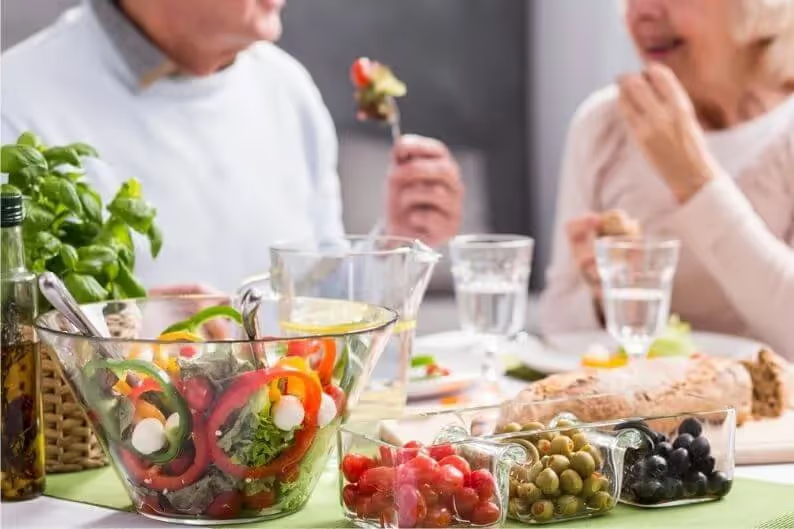Cancer is a complex and challenging disease that affects millions of lives globally. While no single food can prevent cancer, research indicates that maintaining a balanced diet rich in certain nutrients may play a pivotal role in reducing your risk. By making mindful food choices, you may be able to strengthen your body's defense system and create an environment less conducive to cancer cell growth. Read on to explore what cancer prevention foods you should add to your diet and what foods you should avoid.
Understanding the Link Between Diet and Cancer
Our daily food choices influence various aspects of health, including cancer risk. Certain foods and cooking methods are believed to increase the risk of cancer, while others may have protective effects. According to the American Institute for Cancer Research (AICR), about 30 to 40 percent of all cancers can be prevented through a healthy diet, regular physical activity, and maintaining a healthy weight. Focusing on cancer prevention through nutrition doesn't mean following a strict diet but rather emphasizing whole, nutrient-rich foods while minimizing those that increase cancer risk.
Foods That May Help Reduce Cancer Risk
Let's explore cancer prevention foods that may protect against cancer and how to incorporate them into your diet.
1. Cruciferous Vegetables: Broccoli, Cauliflower, and Beyond
Cruciferous vegetables, such as broccoli and cauliflower, are nutritional powerhouses packed with vitamins, minerals, and antioxidants that may help protect against cancer. These vegetables contain sulforaphane, a compound that has been shown to inhibit the growth of cancer cells in laboratory studies. Broccoli, cauliflower, Brussels sprouts, and kale are known for their potential role in reducing the risk of colorectal cancer and other cancers. By including these vegetables in your diet, you not only provide your body with essential nutrients but also promote overall well-being. How to Include Them: Try roasting broccoli and cauliflower with olive oil and garlic. Or add them to salads, stir-fries, and soups for a cancer-fighting boost.
2. Fatty Fish: A Source of Omega-3 Fatty Acids
Fatty fish like salmon, mackerel, and sardines are rich in omega-3 fatty acids, which help to reduce inflammation in the body. Chronic inflammation can contribute to the development of cancer, and omega-3s may play a role in reducing the risk of cancer, particularly breast cancer. Studies suggest that consuming fatty fish may lower the risk of certain cancers by providing anti-inflammatory benefits and supporting immune function. How to Include It: Aim to include fatty fish in your diet at least twice a week. Grilled salmon with a side of roasted vegetables or a fish taco with a squeeze of lime can make for delicious, cancer-fighting meals.
3. Whole Grains: Rich in Fiber and Nutrients
Whole grains, including brown rice, quinoa, oats, and whole wheat, are excellent sources of fiber. Diets rich in fiber help reduce the risk of colorectal cancer. Fiber helps with digestion, moves food through the digestive system more efficiently, and helps maintain a healthy gut microbiome. Additionally, whole grains contain essential vitamins and antioxidants that may support cancer prevention. The American Institute for Cancer Research emphasizes the importance of whole grains as part of a balanced, cancer-protective diet. How to Include Them: Swap refined grains for whole grains whenever possible. Enjoy a warm bowl of oatmeal in the morning or incorporate quinoa and brown rice into your salads and main dishes.
4. Berries: Packed with Antioxidants
Berries, such as blueberries, strawberries, and raspberries, are rich in antioxidants, which help neutralize free radicals—unstable molecules that can damage cells and contribute to cancer development. The antioxidants in berries, particularly vitamin C and ellagic acid, may protect cells from DNA damage, reducing cancer risk. Some studies suggest that berries may help reduce the risk of developing cancer, including breast cancer. This is due to their ability to protect cells from oxidative stress and inflammation. How to Include Them: Add fresh or frozen berries to your morning yogurt, smoothie, or oatmeal for a sweet, antioxidant-packed treat. They also make a sweet addition to salads.
5. Crucial Role of Plant-Based Diets
Plant-based diets, which emphasize fruits, vegetables, whole grains, nuts, and legumes, are associated with a reduced risk of cancer. These cancer prevention foods are rich in fiber, vitamins, minerals, and phytochemicals that protect against cancer. A plant-based diet also helps maintain a healthy weight, which is important because excess weight increases the risk of several cancers. Studies show that people who follow plant-based diets may have a lower risk of developing certain cancers, including colorectal, breast, and prostate cancer. The diversity of nutrients in plant-based diets supports the immune system and helps regulate cell growth. How to Include It: Start by incorporating more plant-based meals into your routine. Try a vegetarian stir-fry or a lentil soup loaded with vegetables for a satisfying, nutrient-dense dish. Meatless Mondays are a great way to introduce a plant-based meal into your weekly routine.
Foods That Increase the Risk of Cancer
While some foods may protect against cancer, others may increase your risk. It's essential to be aware of these foods and limit their consumption.
1. Processed Meats: Hot Dogs, Bacon, and More
Processed meats, including hot dogs, bacon, sausages, and deli meats, have been classified as carcinogenic by the World Health Organization (WHO). These meats are preserved through smoking, curing, or adding salt and chemicals, which can increase the risk of cancer. The American Institute for Cancer Research recommends minimizing the intake of processed meat to reduce the risk of cancer. How to Limit It: If possible, avoid processed meats altogether or save them for special occasions. Instead, opt for lean protein sources like chicken, turkey, or plant-based alternatives.
2. Red Meat: A Link to Colorectal Cancer
Red meat, such as beef, lamb, and pork, has been linked to an increased risk of colorectal cancer. The risk increases with the amount of red meat consumed, especially when cooked at high temperatures, which can produce cancer-causing compounds. While red meat can be part of a balanced diet in moderation, it's wise to limit consumption. The American Institute for Cancer Research suggests no more than 18 ounces of red meat per week to minimize risk. How to Limit It: Try reducing your portion size of red meat and replacing it with plant-based proteins like beans, lentils, or tofu. When cooking red meat, opt for lower-temperature methods like baking or steaming rather than grilling or frying.
3. Alcohol: Moderation Is Key
Excessive alcohol consumption is associated with an increased risk of several cancers, including breast, liver, and mouth cancers. Alcohol can damage DNA and impair the body's ability to repair cells, leading to an increased risk of cancer. While moderate alcohol consumption may have some heart health benefits, it's important to balance this with the potential cancer risks. For cancer prevention, it's best to limit alcohol intake to one drink per day for women and two for men. How to Limit It: Consider replacing alcoholic beverages with water, herbal teas, or sparkling water with a splash of fruit juice for a refreshing alternative. Also, there are more and more NA options popping up on shelves and out at bars.
Making Smart Choices for Cancer Prevention
Nutrition plays an essential role in cancer prevention. By incorporating cancer prevention foods, such as more plant-based alternatives, whole grains, fatty fish, and cruciferous vegetables into your meals, you can help reduce the risk of developing cancer. On the other hand, limiting the consumption of processed meats, red meat, and alcohol can further support your efforts to reduce the risk. Remember, cancer prevention is about long-term lifestyle choices, not perfection. Small changes in your diet, combined with regular exercise, weight management, and avoiding smoking, can help protect your body and reduce cancer risk.
Empower Your Health Through Smart Nutritional Choices
The relationship between diet and cancer is complex. There's compelling evidence that certain foods may help protect against cancer while others may increase the risk. By making informed, health-conscious choices, you can take control of your nutrition and support your body in its fight against cancer. As we continue to learn more about cancer prevention, it's clear that nutrition is a powerful tool in reducing cancer risk. Embrace a balanced, plant-focused diet rich in whole foods, and remember that every positive choice you make contributes to your overall health and well-being.




